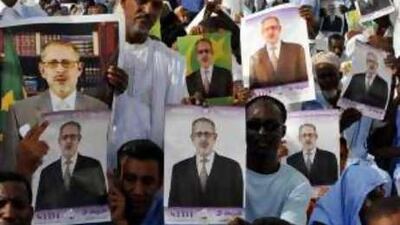FREETOWN // Mauritania's deposed president had supported efforts to charge members of the armed forces for human rights violations - a move that could have been the spark for Wednesday's coup, a leading Mauritanian human rights lawyer said. An amnesty law passed by a previous government has hampered attempts to hold military officers accountable for atrocities committed against civilians, said Fatimata M'baye, who heads the Mauritanian Association for Human Rights and sits on the National Human Rights Commission.
But Sidi Ould Cheikh Abdallahi, who was president before being ousted last week, supported their efforts to work around the agreement to achieve justice. "He was very engaged to find a resolution to this question and to make reconciliation," said Ms M'baye, speaking from the Mauritanian capital, Nouakchott. "The military know what it means - there may be a time when they go to court. To stop this process they made a coup. This is one of the causes."
She said it was one of a number of factors in a continuing struggle between Mr Abdallahi and top military officials. On Wednesday morning, Mr Abdallahi fired four generals, including Gen Mohamed Ould Abdelaziz, the head of the presidential guard. Gen Abdelaziz led a coup later that day when presidential guards seized Mr Abdallahi. The military quickly announced the formation of an 11-member ruling council. It pledged to "renew the democratic process" by holding a "free and democratic" presidential election, but it did not set a date.
Ms M'baye dismissed the promise, suggesting that such an election would be rigged. "They will make an election that elects who they want to put in the president's chair," she said. "They want really to have someone they can manipulate." The European Union, African Union and others swiftly condemned the coup. The US has suspended more than US$20 million (Dh74m) in aid, including $15m slated for Mauritania's military.
But the military council did gain some approval at home. About 1,000 people marched in support on Thursday, and some politicians spoke out in favour of the coup. "This is a moment of correction and realignment for us to be able to go forwards towards democracy," Moustapha Ould Abeiderrahmane, a member of parliament, told Reuters. Mr Abdallahi's year in office has been marked by political crises and accusations of corruption. Facing a no-confidence vote, his cabinet resigned in July, becoming the second government to fall within three months.
Mr Abdallahi dismissed his previous government in May during widespread protests against skyrocketing food prices. Some politicians recently attempted to set up a commission to investigate the country's response to rising living costs. Mauritania has been hit particularly hard by soaring global food prices: the impoverished desert country imports 70 per cent of its food, according to the World Food Programme.
Stéphanie Savariaud, the WFP's spokesman for west Africa, said the government had responded well to the crisis, given the circumstances. "The high food prices crisis has been taken seriously by all parties in Mauritania and the country has been proactive in dealing with a crisis that cannot be solved overnight," she said. Les Campbell, of the Washington-based National Democratic Institute, said Mauritania's political system was strong enough to withstand instability triggered by the food crisis without help from the military.
"Mauritania has ways of managing political problems that don't involve the military," said Mr Campbell, the Middle East and North Africa director for the Institute, which is affiliated with the US Democratic Party and promotes democratic development overseas. Ms M'baye also rejected the idea that Mr Abdallahi needed to be replaced because he was unable to cope with the difficulties facing Mauritania.
"It's very early to make a judgment on his actions," she said. "He just came into power last year." Mr Abdallahi became the country's first democratically elected president in April 2007 after riding to victory on a platform of reconciliation. Ms M'baye said the real reason the military decided to step in was to maintain its traditional grip on power, which could be weakened by Mr Abdallahi's reconciliation programme.
As part of the programme, Mr Abdallahi promised to repatriate about 30,000 refugees still living in neighbouring Senegal and Mali. About 70,000 black Mauritanians fled ethnic violence that killed hundreds in 1989 and was sponsored by the Moor-dominated military government. The first returnees arrived in January. Ms M'baye said their return could add weight and garner support for cases being built against members of the military, including Gen Abdelaziz. While the amnesty agreement prevents lawyers from laying charges in Mauritanian courts, they have done so in France and Senegal, she said.
In 2005, human rights groups fought successfully in a French court to convict Ely Ould Dah, a Mauritanian military officer, in absentia on charges torture and barbarism. Dah fled France while on parole, and has so far avoided his 10-year sentence for torturing two black officers accused of plotting a coup. "The military can't go outside Mauritania because they are targeted by international justice," Ms M'baye said. Mauritania has had more than 10 coups or attempted coups since gaining independence from France in 1960. It is a country deeply divided by ethnic tension between its black and Moorish populations. Moors have traditionally formed the economic and social elite, and slavery of the black population is still widespread.
Mauritania gained more acceptance in the international community after criminalising slavery last year and implementing democratic reforms - which translated into an increase of international aid. The country has also seen modest profits from oil since becoming Africa's newest producer in 2006. @Email:jferrie@thenational.ae

